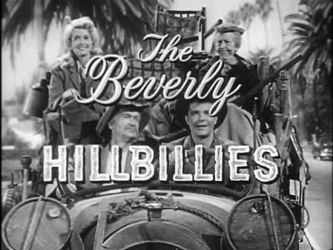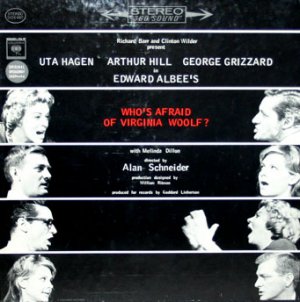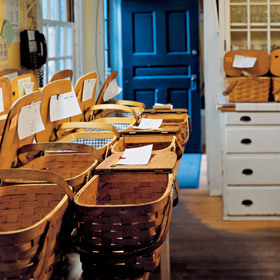In today’s Wall Street Journal “Sightings” column, I reflect on what American art and culture were like in 1962. Here’s an excerpt.
* * *
When did the world in which we now live take fully recognizable shape? I suspect that most middle-aged Americans would point to 1968, the annus horribilis when Martin Luther King, Jr., and Bobby Kennedy were assassinated. But it was in 1962, not 1968, that the curtain first started inching up on our age of full-color anxiety. Turn the clock back exactly a half-century and you’ll find yourself in a different America–but one fraught with subtle signs and portents of what was to come.
 Nowhere is that lost world of confident certitude more clearly visible than in the surviving relics of its popular culture. Fifty years ago, network TV was dominated by family-friendly, resolutely unironic sitcoms like “The Andy Griffith Show,” “My Three Sons” and “The Beverly Hillbillies,” which made its debut in 1962 and promptly shot to the top of the Nielsens. The top-grossing American movies included “How the West Was Won,” “The Longest Day,” “The Music Man,” “That Touch of Mink” and “To Kill a Mockingbird.” Johnny Carson took over “The Tonight Show” in October, and the guest list for his first show was a veritable time capsule of the old America: Tony Bennett, Joan Crawford and Rudy Vallee.
Nowhere is that lost world of confident certitude more clearly visible than in the surviving relics of its popular culture. Fifty years ago, network TV was dominated by family-friendly, resolutely unironic sitcoms like “The Andy Griffith Show,” “My Three Sons” and “The Beverly Hillbillies,” which made its debut in 1962 and promptly shot to the top of the Nielsens. The top-grossing American movies included “How the West Was Won,” “The Longest Day,” “The Music Man,” “That Touch of Mink” and “To Kill a Mockingbird.” Johnny Carson took over “The Tonight Show” in October, and the guest list for his first show was a veritable time capsule of the old America: Tony Bennett, Joan Crawford and Rudy Vallee.
That Carson should have thought Crawford and Vallee suitable guests for his debut is a clear indication of the extent to which American culture in 1962 was still dominated by the fast-receding past….
 Yet the cauldron of change was already bubbling away. Take a second glance at the guest list for Carson’s “Tonight Show” debut and you’ll note the unexpected presence of Mel Brooks, whose raucously, unabashedly vulgar movies would soon help to undermine Hollywood’s long-established sense of the appropriate. Nor was Mr. Brooks the only portent of things to come. Nineteen sixty-two was also the year when Bob Dylan cut his first album. Andy Warhol’s first solo show, an exhibition of Campbell’s Soup cans, opened in Los Angeles in 1962, and Edward Albee’s “Who’s Afraid of Virginia Woolf?” opened on Broadway. As dissimilar as these now-venerable objets d’art may seem to us now, they all had in common the iron determination of their creators to break decisively with the earnest, self-confident tone of postwar culture….
Yet the cauldron of change was already bubbling away. Take a second glance at the guest list for Carson’s “Tonight Show” debut and you’ll note the unexpected presence of Mel Brooks, whose raucously, unabashedly vulgar movies would soon help to undermine Hollywood’s long-established sense of the appropriate. Nor was Mr. Brooks the only portent of things to come. Nineteen sixty-two was also the year when Bob Dylan cut his first album. Andy Warhol’s first solo show, an exhibition of Campbell’s Soup cans, opened in Los Angeles in 1962, and Edward Albee’s “Who’s Afraid of Virginia Woolf?” opened on Broadway. As dissimilar as these now-venerable objets d’art may seem to us now, they all had in common the iron determination of their creators to break decisively with the earnest, self-confident tone of postwar culture….
* * *
Read the whole thing here.
Philip Larkin reads “Annus Mirabilis”:
Archives for 2012
TT: Almanac
We would rather be ruined than changed
We would rather die in our dread
Than climb the cross of the moment
And let our illusions die.
W.H. Auden, The Age of Anxiety
TT: Declaration of independence
 I finished writing and editing the twelfth chapter of Mood Indigo: A Life of Duke Ellington (out of a projected seventeen) last night. As of today I’ve written 40,000 words of the first draft of Mood Indigo in my four-and-a-half weeks at the MacDowell Colony. On Wednesday I finished working on the final pre-rehearsal draft of Satchmo at the Waldorf, the one that John Douglas Thompson will start to memorize tomorrow, and I’ve also done a fair amount of work on the revised version of The Letter that will be premiered in February at Dicapo Opera Theatre in New York.
I finished writing and editing the twelfth chapter of Mood Indigo: A Life of Duke Ellington (out of a projected seventeen) last night. As of today I’ve written 40,000 words of the first draft of Mood Indigo in my four-and-a-half weeks at the MacDowell Colony. On Wednesday I finished working on the final pre-rehearsal draft of Satchmo at the Waldorf, the one that John Douglas Thompson will start to memorize tomorrow, and I’ve also done a fair amount of work on the revised version of The Letter that will be premiered in February at Dicapo Opera Theatre in New York.
I reported these achievements to my best friend at MacDowell after I trudged back to Colony Hall from my studio last night, feeling both elated and exhausted. Then, without warning, I said something that took me by surprise: “You know what? I’m glad I’ve done all that work–that’s what I thought I came here to do–but I just realized that I haven’t really been present here. I know I’ve had a wonderful time and made some wonderful friends, but I feel like I’ve missed something…and I’m leaving on Monday.”
She looked at me and said, very seriously, “So what are you going to do about it?”
 I paused. Then I blurted, “I’m not going to do any more work while I’m here–that’s what I’m going to do! I’m going to walk all around the colony and look at all the studios, and I’m going to walk all over Peterborough, and I’m going to let go of the book and the play! Completely! Let’s shake on it.”
I paused. Then I blurted, “I’m not going to do any more work while I’m here–that’s what I’m going to do! I’m going to walk all around the colony and look at all the studios, and I’m going to walk all over Peterborough, and I’m going to let go of the book and the play! Completely! Let’s shake on it.”
We shook hands and started giggling like a couple of schoolchildren.
This morning at breakfast I said farewell to my friend, who is going back to the world this afternoon. Then I went into the kitchen and signed out for lunch. Nobody will be delivering a picnic basket to my studio today. I won’t be there. My work can wait–it’ll be there when I, too, return to the outside world. It always is. Instead I plan to spend the next three days reveling in the beauties of this miraculous place. It’s about time.
Thanks, friend.
TT: So you want to see a show?
Here’s my list of recommended Broadway, off-Broadway, and out-of-town shows, updated weekly. In all cases, I gave these shows favorable reviews (if sometimes qualifiedly so) in The Wall Street Journal when they opened. For more information, click on the title.
BROADWAY:
• The Best Man (drama, PG-13, closes Sept. 9, most performances sold out last week, reviewed here)
• Evita (musical, PG-13, most performances sold out last week, reviewed here)
• Once (musical, G/PG-13, all performances sold out last week, reviewed here)
OFF BROADWAY:
• Avenue Q (musical, R, adult subject matter and one show-stopping scene of puppet-on-puppet sex, reviewed here)
• The Fantasticks (musical, G, suitable for children capable of enjoying a love story, reviewed here)
• Tribes (drama, PG-13, extended through Jan. 6, reviewed here)
IN CHICAGO:
• Freud’s Last Session (drama, PG-13, restaging of off-Broadway production, closes Sept. 2, reviewed here)
CLOSING SOON IN CHICAGO:
• A Little Night Music (musical, PG-13, closes Aug. 12, reviewed here)
CLOSING SOON ON BROADWAY:
• Anything Goes (musical, G/PG-13, mildly adult subject matter that will be unintelligible to children, closes Aug. 5, reviewed here)
TT: Almanac
“The poet who writes ‘free’ verse is like Robinson Crusoe on his desert island: he must do all his cooking, laundry and darning for himself. In a few exceptional cases, this manly independence produces something original and impressive, but more often the result is squalor–dirty sheets on the unmade bed and empty bottles on the unswept floor.”
W.H. Auden, “Writing”
TT: Snapshot
Glenn Gould practices Bach’s C Minor Partita:
(This is the latest in a series of arts-related videos that appear in this space each Monday and Wednesday.)
TT: Almanac
“One cannot review a bad book without showing off.”
W.H. Auden, “Reading”
TT: Lookback
From 2004:
For me, The Rules of the Game is the obvious Greatest Movie Ever Made, and I expect a lot of other critics would agree with me, or at least consider it a completely plausible candidate. Beyond that, I have my doubts. Right at this moment–and no other–I’d be inclined to follow it up with Citizen Kane, Vertigo, The General (a silent film, please note!), and…er, um…I don’t know. The Searchers? His Girl Friday? Chinatown? I simply can’t tell you. The greatest opera ever written is The Marriage of Figaro, except when it’s Falstaff, but what’s the fifth greatest? That’s a party game…
Read the whole thing here.
